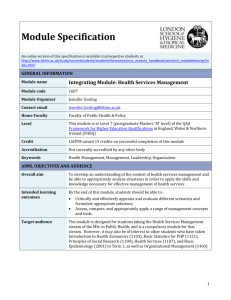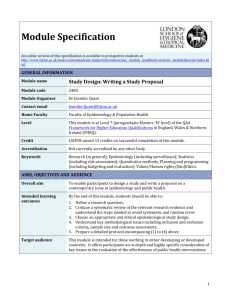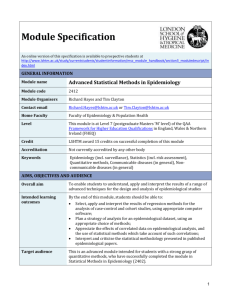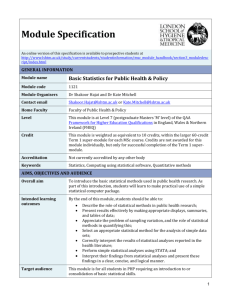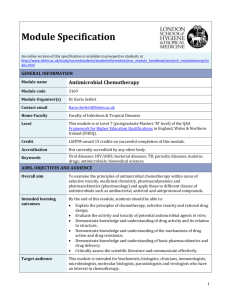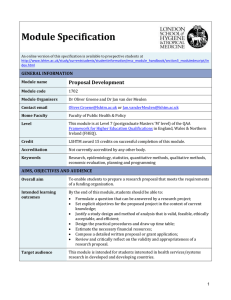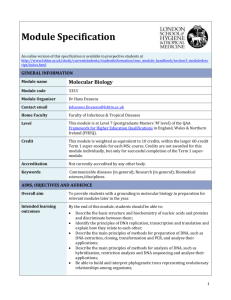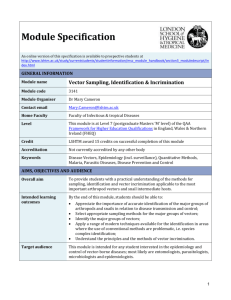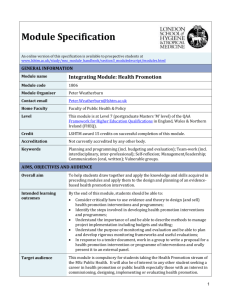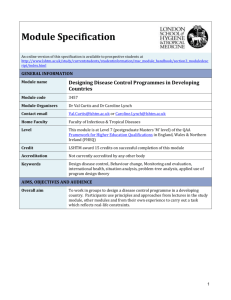2448 Genetic Epidemiology Module Specification
advertisement
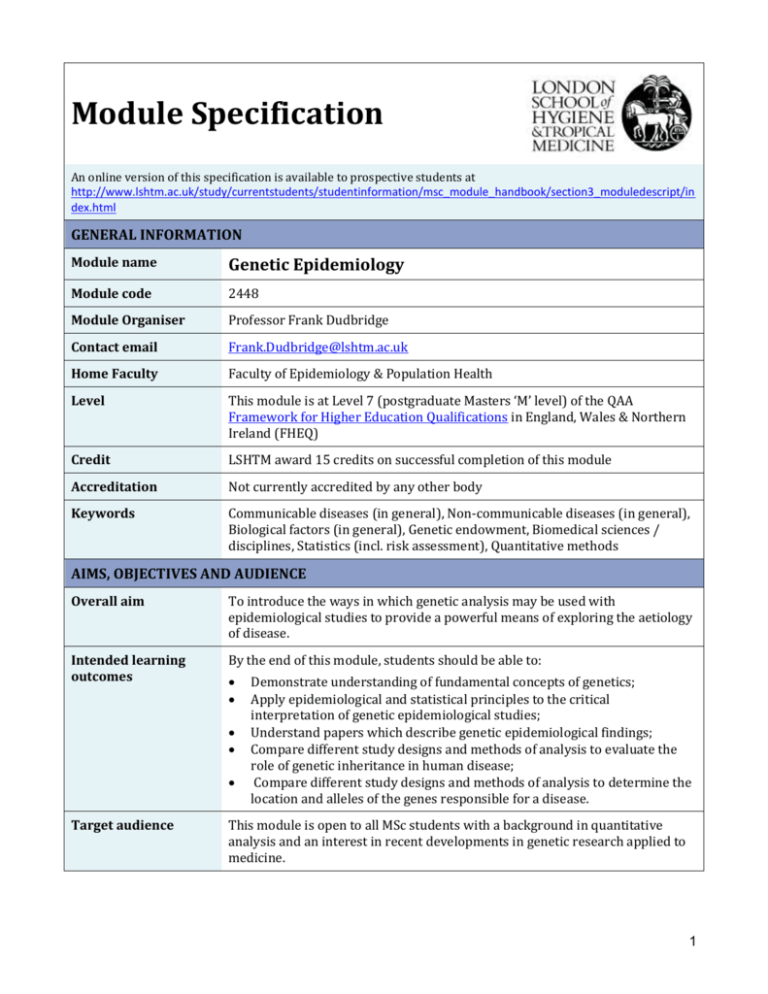
Module Specification An online version of this specification is available to prospective students at http://www.lshtm.ac.uk/study/currentstudents/studentinformation/msc_module_handbook/section3_moduledescript/in dex.html GENERAL INFORMATION Module name Genetic Epidemiology Module code 2448 Module Organiser Professor Frank Dudbridge Contact email Frank.Dudbridge@lshtm.ac.uk Home Faculty Faculty of Epidemiology & Population Health Level This module is at Level 7 (postgraduate Masters ‘M’ level) of the QAA Framework for Higher Education Qualifications in England, Wales & Northern Ireland (FHEQ) Credit LSHTM award 15 credits on successful completion of this module Accreditation Not currently accredited by any other body Keywords Communicable diseases (in general), Non-communicable diseases (in general), Biological factors (in general), Genetic endowment, Biomedical sciences / disciplines, Statistics (incl. risk assessment), Quantitative methods AIMS, OBJECTIVES AND AUDIENCE Overall aim To introduce the ways in which genetic analysis may be used with epidemiological studies to provide a powerful means of exploring the aetiology of disease. Intended learning outcomes By the end of this module, students should be able to: Target audience Demonstrate understanding of fundamental concepts of genetics; Apply epidemiological and statistical principles to the critical interpretation of genetic epidemiological studies; Understand papers which describe genetic epidemiological findings; Compare different study designs and methods of analysis to evaluate the role of genetic inheritance in human disease; Compare different study designs and methods of analysis to determine the location and alleles of the genes responsible for a disease. This module is open to all MSc students with a background in quantitative analysis and an interest in recent developments in genetic research applied to medicine. 1 CONTENT Session content The module is expected to include sessions addressing the following topics (please note that these may be subject to change): Introduction to Genetics: genes and chromosomes, alleles and polymorphisms, Mendelian Inheritance, linkage, penetrance, quantitative genetics, computational analysis; Studies to determine the extent of genetic contribution to a disease, and its mode of transmission: family studies, twin studies, segregation analysis; Studies to determine the location of the gene, and the allele responsible for a disease: pedigree studies, case/control association studies, genome-wide association studies; Current developments in genetics, including Mendelian randomisation, and ethical aspects. TEACHING, LEARNING AND ASSESSMENT Study resources provided or required Lecture notes are provided for each session in the module together with associated papers from scientific journals. Teaching and learning methods Teaching will be a mixture of lectures, practicals and group discussion of published papers. There will also be seminars on current research. Assessment details The assessment consists of a review of the genetics of a complex disease based on critiquing three papers provided in advance. The strengths and weaknesses of each paper are discussed and a general summary of the field and its prospects is provided. For students who are required to re-sit, or granted a deferral or new attempt, the task will be a review of the genetics of a complex disease, different to the one used in the first assessment. Assessment dates Assessments will be due in the last week of teaching. For students who are required to re-sit, or granted a deferral or new attempt, the next assessment deadline will be the standard School-recommended date in mid/late September 2016. Language of study and assessment English (please see ‘English language requirements’ below regarding the standard required for entry). TIMING AND MODE OF STUDY Duration The module runs for 5 weeks at 2.5 days per week, from Wednesday lunchtime to Friday afternoon. Dates For 2015-16, the module will start on Wednesday 24 February 2016 and finish on Thursday 25 March 2016. Timetable slot The module runs in LSHTM timetable slot D2 Mode of Study The module is taught face-to-face in London. Both full-time and part-time students follow the same schedule. For full-time students, other LSHTM modules are available in the other half of the week for the C and D slots. 2 Learning time The notional learning time for the module totals 150 hours, consisting of: Contact time ≈ 51 hours Directed self-study ≈ 10 hours Self-directed learning ≈ 40 hours Assessment, review and revision ≈ 49 hours APPLICATION, ADMISSION AND FEES Pre-requisites Students should be comfortable with statistical analyses up to SME level. Background reading will be provided where necessary on the essentials of molecular biology (for epidemiologists) and on epidemiology and statistics (for laboratory scientists). English language requirements A strong command of the English language is necessary to benefit from studying the module. Applicants whose first language is not English or whose prior university studies have not been conducted wholly in English must fulfil LSHTM’s English language requirements, with an acceptable score in an approved test taken in the two years prior to entry. Applicants may be asked to take a test even if the standard conditions have been met. Student numbers Student numbers are typically 10 per year; numbers may be capped due to limitations in facilities or staffing. Student selection Preference will be given to LSHTM MSc students, particularly those registered for Epidemiology or who have taken prior modules in statistical methods, and LSHTM research degree students. Other applicants meeting the entry criteria will usually be offered a place in the order applications are received, until any cap on numbers is reached. Applicants may be placed on a waiting list and given priority the next time the module is run. Partial Registration (partial participation) by LSHTM research degree students is allowed for this module. Fees For registered LSHTM MSc students, fees for the module are included within MSc fees (given on individual course prospectus pages). If registering specifically for this module, as a stand-alone short course, individual module fees will apply. Tuition fees must be paid in full before commencing the module, or by any fee deadline set by the Registry. Scholarships Scholarships are not available for individual modules. Some potential sources of funding are detailed on the LSHTM website. Admission deadlines For 2015-16: For registered LSHTM MSc students, the module choice deadline (for Term 2 and 3 modules) is Friday 20 November 2015 . If registering specifically for this module, applications may be made at any time but, as places are limited, applications ahead of the MSc deadline are strongly advised. All applications should be submitted at the latest 8 weeks prior to the start of the module. Formal registration will take place on the morning of the first day of the module. 3 ABOUT THIS DOCUMENT This module specification applies for the academic year 2015-16 Last revised 1 July 2015 by Frank Dudbridge Minor amendments 20 July 15 SDB London School of Hygiene & Tropical Medicine, Keppel St., London WC1E 7HT. www.lshtm.ac.uk 4

